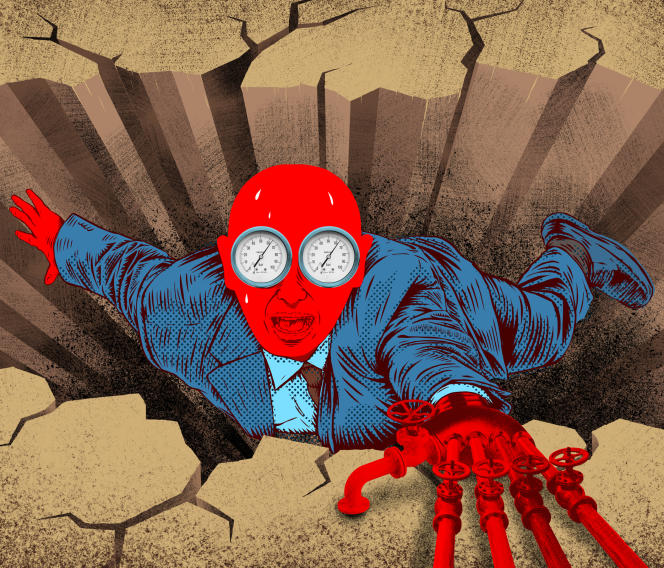This French cement manufacturer blames himself enormously, and he is not the only one in this case. “In 2021, our energy adviser had offered to buy electricity at 80 euros per megawatt hour for 2022. I did not do so, considering this price too high. I was wrong, today the spot price [instant market] is 19 times higher than the price of Regulated Access to historical nuclear electricity of 42 euros. However, at 800 euros per megawatt hour, I lose money, ”laments the leader, who requested anonymity.
This producer, who heats his products to 1,450 degrees, is particularly energy-intensive. But even less energy-intensive manufacturers or transporters are panicking at the soaring prices. “Gas and electricity bills, which have already increased sharply in 2022, will double in 2023, warns Yann Dolbeau, expert in energy cost management at Enoptea (EPSA Energy). Some will not be able to pay. Breakage is expected. »
“Despite the accumulation of difficulties – disruption of supply chains, inflation, war in Ukraine… – most industrialists I meet tell me that at this stage they observe good resistance in their activity”, tempers Alexandre Saubot, president of France Industrie, while recognizing “a very great heterogeneity of situations”. “Some can pass on their rising costs well, some can’t. »
To these concerns about prices is now added the fear of energy rationing this winter. While everyone is wondering if Gazprom will open at full capacity, on July 21, the valves of the Nord Stream 1 gas pipeline, currently under maintenance, the French government has given the alert. During his interview on July 14 on TF1 and France 2, Emmanuel Macron urged the nation to prepare “for a scenario where we have to do without Russian gas”. He announced that the government would build a sobriety plan to “get through the peak of winter” while “helping our neighbors.”
“Drops in production, even stoppages”
In fact, only 17% of France’s energy needs are met by Russia. But – nothing to do with the war in Ukraine – the situation in the country was already very tense on the front of electricity production, with half of the reactors dormant due to corrosion and other droughts. At the moment, France is importing power, especially from Germany. So many flows that should dry up if our main partner were deprived of Russian gas: on the contrary, it would then become necessary to support it. These tensions largely explain the recent surge in gas and electricity prices, which could increase further.
Will there be power at Christmas? Everything will depend on the severity of the winter and the effective connection to the network of the faulty nuclear power plants. But energy suppliers are already warning that winter 2023-2024 will probably be even more difficult to pass. Suffice to say that behind the scenes the negotiations did not wait for the announcement of a “sobriety plan” to get started.
On the price side, first, industrialists are campaigning for EDF to sell more of its nuclear production to alternative suppliers at friendly prices, under Regulated Access to historical nuclear electricity. “It is vital to avoid carnage. Otherwise, we will have production cuts, or even stoppages”, warns Frank Roubanovitch, president of CLEEE, an association of companies that consume large amounts of gas and electricity: in mid-June, 40% of its members had not entered into a forward contract for their electricity supply.
“Reallocate gas to industries that need it most”
At the same time, the prospect of a shortage of supplies is pushing everyone to preach who for their ovens, who for their fridges. According to Les Echos, the French Telecom Federation is struggling with the public authorities to ensure that telecom operators are considered a priority, in order to avoid cuts. “The load shedding worries us much more than the rise in energy prices”, explained to the daily Michel Combot, the director general of the French Federation of telecoms.
“We can imagine that companies and individuals make an effort, for example, by lowering the heating by 1° to 2°C. This will cost the French economy much less than rationing gas in certain industrial sectors. We must also be able to reallocate the gas to the industrialists who need it the most, with the possibility of exchanges between them. This will have to be decided as close as possible to the field, ”preaches, for his part, Mr. Saubot.
In the meantime, manufacturers are preparing for the worst. “We have converted our boilers, so that they are able to run on gas or oil and even that we can switch to coal if we need to,” Michelin President Florent Menegaux told Reuters, adding: ” The objective is not to have to stop the factory in the event of tension. “Everyone must put themselves in battle order at their level. What equipment do I cut, how gradually, what notice? These arbitrations will have to be made with the customers. Some are ready to absorb the additional energy costs, others are not. It is also necessary to come to an agreement with the unions to organize the work”, lists Jean-Pierre Floris, former interministerial delegate for restructuring, who has become a consultant.
“It’s impossible, unmanageable”
The tertiary is also worried. “We have triggered an internal crisis plan,” revealed Dominique Schelcher, CEO of System U, during the World Economy Club on June 30. “I have the bosses around me telling me: what if tomorrow the government says there is going to be a two-hour cut? In a job like ours, it’s impossible, unmanageable. We will have to find solutions. The main thing, of course, is to reduce consumption. This is what Carrefour promises. The brand will be the first major distributor to join, on Monday July 18, the Ecowatt system promoted by the Electricity Transport Network (RTE) and the Environment and Energy Management Agency (Ademe).
“We have tools in place to track our energy consumption, hour by hour, across our 450 sites. We want to be able to compare agency by agency, if the consumption is normal, to make sure that we do not consume on the weekend, to hunt for a possible electrical appliance that is too greedy or for non-optimized installations, relates Christophe Gascoin, director financier of Rexel France, distributor of electrical equipment. We want to get 10%, 15% or even 20% energy savings. We know that 2023 will be very complicated. »
“Returns on investments are much shorter when prices have tripled. To reduce their consumption, our customers are ready to replace machines, change production units, which they did not plan to do a year ago,” continues Mr. Dolbeau. Hoping that this virtuous effect of the increase in tariffs on consumption can compensate for the regression for the climate that constitutes the revival of power stations and other coal or oil-fired boilers.
Finally, we must not forget that, according to UBS forecasts, a halt in Russian gas deliveries would plunge the euro zone into recession. In which case, the energy needs should decrease…

















